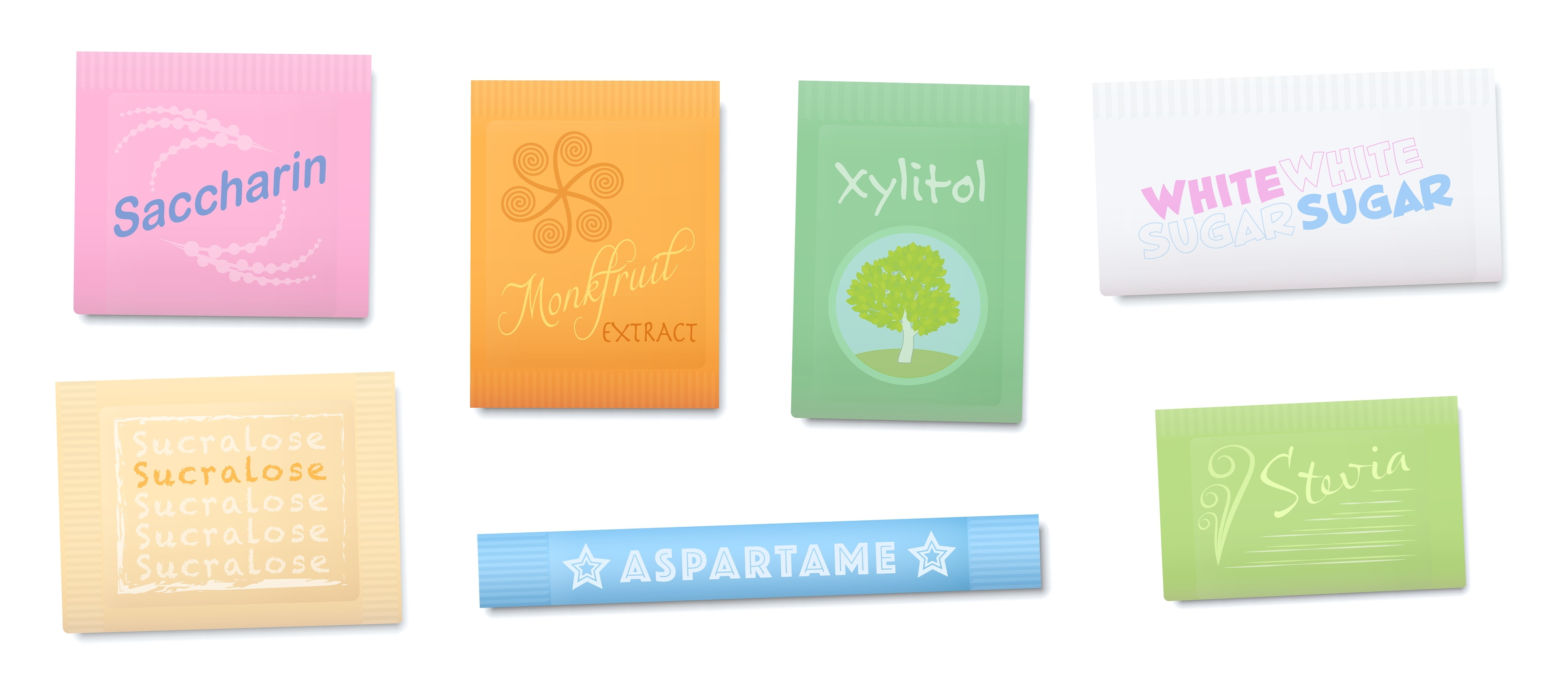Artificial sweeteners, also known as non-nutritive sweeteners (NNSs) or high-intensity sweeteners, are synthetic food additives that have been developed as an alternative to naturally occurring sweeteners such as sucrose or sugar alcohols.1,2 They are intended to sweeten food products with a negligible impact on their caloric value. They are widely used as ingredients in pre-packaged foods and beverages.
Despite the intention for these sugar substitutes to reduce calories and therefore improve overall health, many studies have debated whether or not artificial sweeteners are better than their natural counterparts. Research suggests that NNSs may be beneficial for weight loss and glycemic control; however, effects on brain behavior and the gut microbiome may negate these benefits. The state of the literature is highly heterogenous, making it difficult to make a definitive recommendation regarding the use of artificial sweeteners.3
In 2022, the World Health Organization (WHO) published a meta-analysis of 283 studies on the effects of artificial sweeteners, examining a myriad of outcomes.1 The findings indicated that higher consumption of artificial sweeteners was associated with decreased body weight (reduction of 1.57 lbs [0.71 kg]), total caloric intake (134 calories [560 kJ]), and sugar intake (39 g [9.3 teaspoons] per day). The studies had conflicting findings, but there was an overall trend of increased appetite and decreased satiety as well as increased risk of developing type 2 diabetes, cardiovascular events, stroke, cardiovascular disease mortality, and all-cause mortality. Consumption of artificial sweeteners did not have a significant effect on other markers, including body mass index (BMI), adiposity, glycemic control, risk of developing coronary heart disease, risk of cancer incidence or mortality, development of chronic kidney disease, incidence of dental cavities, mood, or neurocognition.
Glycemic Control
The main benefit of NNSs is their lack of effect on blood glucose levels. A 2018 systematic review and meta-analysis evaluated 29 randomized controlled trials (RCTs) (n=741) that tracked blood glucose concentration after NNS consumption.4 Participants’ blood glucose levels did not change significantly after consumption of NNSs and declined during the 210 minute observation period. There was no difference in glycemic impact between the NNS types used. Although this result suggests that NNSs may be a useful aid for those with diabetes, the authors caution that regardless of the short-term absence of glycemic impact, NNSs could potentially still be associated with long-term health detriments.
Weight
A 2017 meta-analysis of seven RCTs (n=1,003) and 30 cohort studies (n=405,907) examined the impact of NNSs on BMI and other cardiometabolic end points.5 Among the RCTs, NNSs had no significant effect on BMI (reduction of 0.37) and no consistent effects on other measures of body composition or secondary outcomes. Among the cohort studies, NNSs were associated with a slight increase in BMI (0.77) and waist circumference (2.27 cm). The authors noted that many studies had the potential for bias with industry sponsorship and that these studies tended to have positive findings.
Varying results of NNSs on BMI and weight have been hypothesized to be related to the interplay between reduced calorie intake and increased appetite. A 2016 randomized crossover study compared food intake after drinking sweetened beverages.6 Thirty healthy men were given a fixed breakfast and then randomly assigned to drink beverages sweetened with aspartame, monk fruit extract, stevia, or sucrose. After one hour, they were given an ad libitum lunch as well as a food diary to monitor the rest of the day’s meals. They were asked to rank their level of hunger and desire to eat on a scale of 0-100, with 0 indicating nothing and 100 indicating extreme hunger. Compared to those who drank sucrose, those who drank NNSs had a significantly higher level of hunger (73.6 vs 67.4, p=0.005) and desire to eat (74.5 vs 68.2 (p<0.001) 30-60 minutes after having their beverage. Lunch intake was moderately but significantly higher in the NNS group (799 vs 742 calories, p<0.05). However, meal intake after lunch did not differ between treatments, and there was no significant difference in total daily energy intake. The researchers concluded that the calories that were saved from NNS replacement were compensated for by the extra consumption during the lunch meal, leading to a minimal influence of NNSs on daily energy intake.
Gut Microbiome
An area of increasing interest is the effect on the gut microbiome, although research is currently limited. While some studies find a lack of evidence that NNS consumption has an impact,7 other suggest that there is a potentially unhealthy alteration of the microbiome.8,9 A 2019 cross-sectional study examined fecal samples from adults with morbid obesity (n=89) to analyze microbiota.8 NNs consumption was associated with alterations in four groups of microbes, and notably, reduced levels of butyric acid, which has anti-obesogenic effects, reduces insulin resistance, and improves dyslipidemia.
References
- Rios-Leyvraz M, Montez J. Health effects of the use of non-sugar sweeteners: a systematic review and meta-analysis. World Health Organization; 2022.
- Artificial sweeteners. In: Aronson JK, editor. Meyler's Side Effects of Drugs: The International Encyclopedia of Adverse Drug Reactions and Interactions. 16 ed: Elsevier Science; 2016.
- Lohner S, Toews I, Meerpohl JJ. Health outcomes of non-nutritive sweeteners: analysis of the research landscape. Nutrition journal. Sep 8 2017;16(1):55. doi:10.1186/s12937-017-0278-x
- Nichol AD, Holle MJ, An R. Glycemic impact of non-nutritive sweeteners: a systematic review and meta-analysis of randomized controlled trials. Eur J Clin Nutr. Jun 2018;72(6):796-804. doi:10.1038/s41430-018-0170-6
- Azad MB, Abou-Setta AM, Chauhan BF, et al. Nonnutritive sweeteners and cardiometabolic health: a systematic review and meta-analysis of randomized controlled trials and prospective cohort studies. Cmaj. Jul 17 2017;189(28):E929-e939. doi:10.1503/cmaj.161390
- Tey SL, Salleh NB, Henry J, Forde CG. Effects of aspartame-, monk fruit-, stevia- and sucrose-sweetened beverages on postprandial glucose, insulin and energy intake. Int J Obes (Lond). Mar 2017;41(3):450-457. doi:10.1038/ijo.2016.225
- Thomson P, Santibañez R, Aguirre C, Galgani JE, Garrido D. Short-term impact of sucralose consumption on the metabolic response and gut microbiome of healthy adults. Br J Nutr. Oct 28 2019;122(8):856-862. doi:10.1017/s0007114519001570
- Farup PG, Lydersen S, Valeur J. Are Nonnutritive Sweeteners Obesogenic? Associations between Diet, Faecal Microbiota, and Short-Chain Fatty Acids in Morbidly Obese Subjects. J Obes. 2019;2019:4608315. doi:10.1155/2019/4608315
- Suez J, Korem T, Zeevi D, et al. Artificial sweeteners induce glucose intolerance by altering the gut microbiota. Nature. Oct 9 2014;514(7521):181-6. doi:10.1038/nature13793



